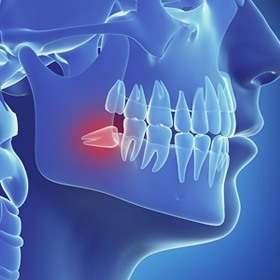Third molars, also known as wisdom teeth, are the last set of permanent teeth that grow. For most of us there is limited space to no space for them to erupt. Due to the position and lack of space wisdom teeth are associated with multiple problems.

Types of Wisdom Teeth
Wisdom teeth sometimes erupt partially leading to pain and swelling of the surrounding tissue. This can be due to food particles and bacteria that collect in the area of the teeth or due to trauma to the tissue around the teeth.
Other times wisdom teeth are impacted, meaning that the teeth are unable to erupt. This is mostly due to the orientation of the teeth and lack of space. Impacted wisdom teeth can impinge on other teeth and lead to decay, periodontal disease or infection. They can also be associated with the development of cysts, tumors or other pathologic processes. If these lesions get ignored they can increase in size and become more difficult to treat.
The recommendation is to remove wisdom teeth prior to complete development of the roots. Younger patients tend to heal and recover quickly with a decreased chance of complications. Although the recommendations are to remove wisdom teeth prior to age 25 if able, any patient is a candidate for wisdom teeth removal depending on the patients needs.
Having Third Molar Surgery
An Oral and Maxillofacial Surgeon typically performs this surgery on an outpatient basis. Dr. Mazen Duraini will discuss the nature of the surgery and the level of sedation or anesthesia needed for your surgery. Patients are typically seen for a consultation prior to surgery to answer any questions and discuss the possible risks associated.



